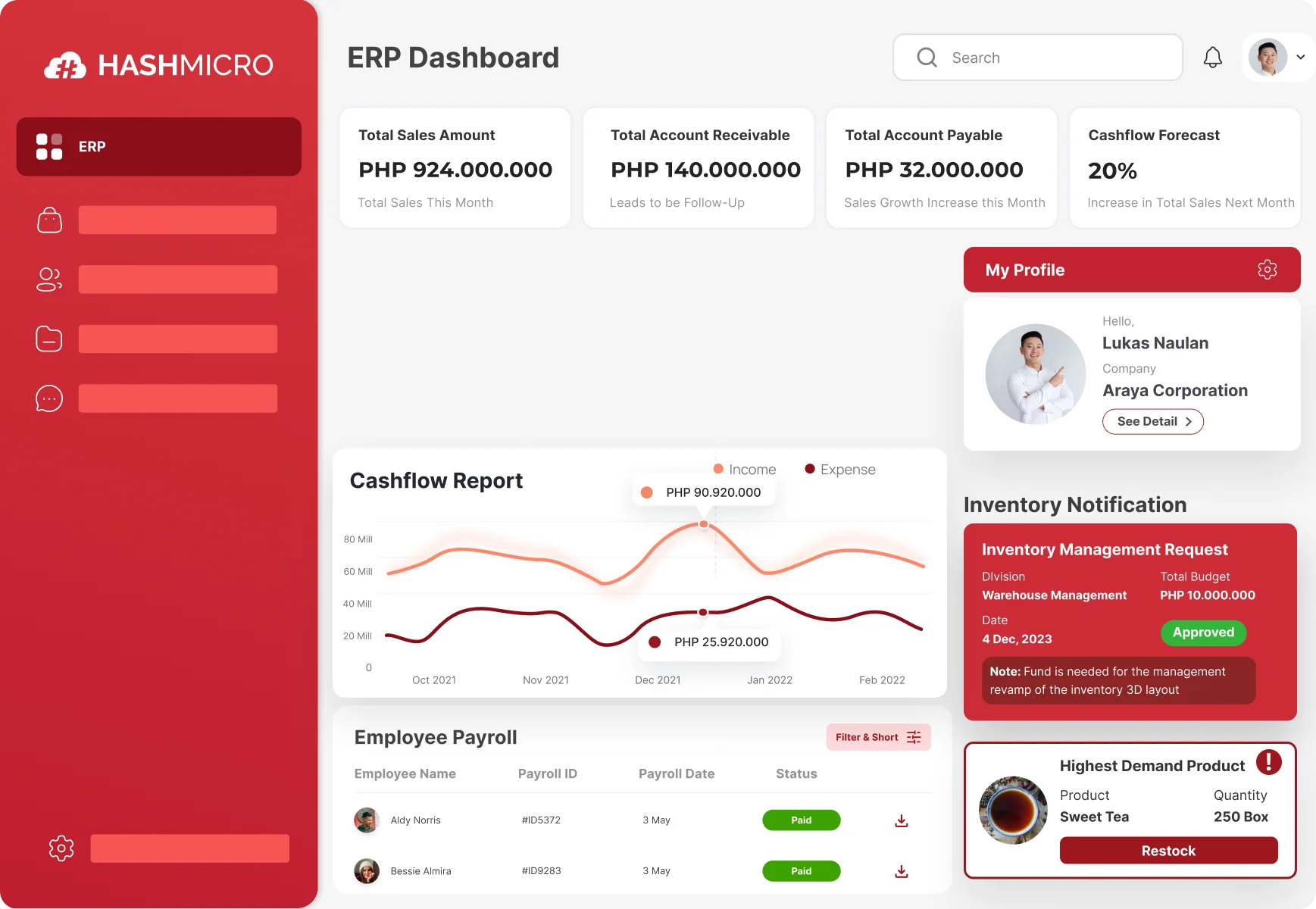ESG meaning—everyone’s talking about it. Climate change has already made a huge impact on daily lives, and customers now expect brands to be sustainable. Sustainability and ethics are not a trend anymore, but rapidly becoming a standard for company practice.
And the result? Customers are ditching brands that don’t care, and prefer sustainable companies. Investors? They go where ESG is documented and proven. So, you don’t want to be left behind, do you? Then it’s time for you to learn why this practice is on the rise now.
And before we proceed, if you think that creating reports and tracking all the data are unnecessary trouble, you can try HashMicro ERP to solve the problems with keeping all the data and compiling them to make customized reports in just a few clicks.
So, without further ado, this article will guide you to understanding what ESG meaning is and why you should care to implement it in your business.
Key Takeaways
|
Table of Contents
What is ESG?
ESG (Environmental, Social, and Governance) is an investment approach that prioritizes sustainability, ethics, and corporate responsibility. It’s often called responsible investing—or impact investing when taken a step further.
Companies release ESG reports to stay transparent and meet investor expectations. These reports cover business risks and opportunities tied to sustainability, from carbon emissions and labor policies to workforce diversity and executive pay.
But what does ESG really mean? Here’s a quick breakdown of each pillar:
Environmental
The “E” in ESG refers to a company’s responsibility toward the environment, including energy use and efforts to minimize environmental harm. Key areas include:
- Carbon emissions
- Energy consumption
- Climate change impact
- Pollution
- Waste management
- Renewable energy use
- Resource conservation
Social
The social aspect of ESG focuses on how companies support people, workplace culture, and community well-being. It includes:
- Anti-discrimination policies
- Workforce diversity
- Human rights protection
- Community engagement
Governance
Governance in ESG involves how a company is managed, its leadership accountability, and transparency in decision-making. Key governance topics include:
- Corporate policies and transparency
- Executive pay structures
- Shareholder rights
- Protection against hostile takeovers
- Board structure and independence
- Fair board elections
- Political donations and influence
- Whistleblower programs
Hashy AI Fact

Need to know!
ESG focuses on sustainability, ethics, and governance to ensure responsible investing. With Hashy AI from HashMicro, your ESG management becomes more efficient and data-driven.
Get a Free Demo Now!
Why is ESG Important for Business?
ESG shot to fame with the 2004 UN-backed report Who Cares Wins, bringing sustainability into the spotlight. By 2023, it had evolved into a global movement and influenced over US$30 trillion in managed assets.
With climate change, human rights, and fair wages now major concerns, ESG is a business priority. Here’s what it focuses on:
- Transparency: ESG reports provide detailed insights into a company’s sustainability efforts, so the investors can take a look at the data and decide whether the company is worth investing in.
- Long-term sustainability – ESG frameworks assess their impact and track progress, which demonstrate a commitment to ethical and long-term growth.
- Risk management – A strong ESG strategy helps businesses spot and reduce sustainability-related risks.
- Regulatory compliance – With stricter regulations emerging, ESG frameworks help companies avoid fines and legal issues.
Pros and Cons of ESG
The pros and cons of ESG can impact businesses and investors in different ways. While ESG brings long-term benefits, it also comes with challenges. Here’s a quick look at both sides:
| Pros | Cons |
| ESG funds can outperform traditional ones. Sustainable investments have shown strong returns, with some funds performing better than traditional ones. | No one-size-fits-all approach. ESG strategies vary by company, making implementation complex. |
| Attracts customers and drives growth. ESG-focused businesses appeal to conscious consumers, improving loyalty and revenue. | Risk of backlash from greenwashing. Fake or inconsistent ESG efforts can damage brand reputation and stock value. |
| Encourages smarter, ethical investments. Companies adopting ESG often make better long-term financial, social, and environmental decisions. | Stock performance isn’t guaranteed. Market trends and economic shifts still affect ESG stocks and funds. |
| Helps attract and retain top talent. Employees prefer companies that align with their values, boosting satisfaction and productivity. | Limited investment choices. ESG investors may struggle to create a diverse, well-balanced portfolio. |
| Reduces costs in the long run. Lower energy use, waste reduction, and efficiency improvements help cut expenses. | ESG reporting can be difficult. Measuring impact is complex, and reporting standards are inconsistent. |
While ESG offers many advantages, companies and investors need to approach it with a clear strategy and genuine commitment. However, keep in mind that ignoring ESG means falling behind to competitors, as the customers now prefer brands with good ESG practices.
How to Define ESG Goals
 Setting ESG goals and timelines is a strategic process that should align with a company’s mission, values, and long-term vision. This process involves the following steps:
Setting ESG goals and timelines is a strategic process that should align with a company’s mission, values, and long-term vision. This process involves the following steps:
- Establish ESG needs. Start with a baseline assessment to understand the organization’s current ESG position and requirements.
- Identify key areas for ESG frameworks. Determine focus areas for improvement, such as compliance efforts, greener technology, sustainable supply chains, carbon offset strategies, or net-zero commitments.
- Set goals. Ensure ESG goals align with business strategies and follow the SMART criteria—specific, measurable, achievable, realistic, and time-bound.
- Determine responsibilities. Define roles and governance structures to ensure clear accountability within the organization.
- Create a timeline. Break goals into short-term (1-2 years), medium-term (3-5 years), and long-term (5+ years) milestones to track progress.
- Measure and adjust. Continuously monitor ESG performance and make necessary adjustments over time.
ESG initiatives often take years to show results. Long-term projects, like reaching net-zero emissions, require ongoing monitoring, reporting, and adaptation to stay on track.
How to Collect and Report on ESG Data
A solid ESG data collection process keeps reporting accurate, organized, and hassle-free. It helps businesses gather, analyze, and clean ESG-related data efficiently.
While methods vary by framework, common strategies include:
- Data aggregation: Collect ESG data from key departments like operations, HR, and finance.
- Centralized data system: Store and access all ESG data in one place for consistency.
- Surveys, audits & reports: Use employee surveys, environmental audits, and business reports to gather insights.
- Automation: Let AI-powered tools handle ESG data collection and real-time monitoring.
Businesses in the Philippines can use several ESG reporting frameworks to guide their sustainability efforts. Some of the most relevant ones include:
- IFRS Sustainability Disclosure Standards – Aims to unify ESG reporting by consolidating different frameworks, so sustainability disclosures are clearer and standardized for.
- SASB Standards – Focuses on financial relevance, so companies connect ESG efforts to financial performance and investor decision-making.
- GRI Standards – Broad and widely used, offering detailed sustainability reporting guidelines across industries. This framework covers a wider range of social and environmental impacts.
- TCFD Recommendations – Specializes in climate-related financial risks. TCFD is specific to climate change’s impact on business finances and includes governance, strategy, and risk management.
- CDP – Focuses on climate risks, water security, and deforestation. While similar to TCFD in climate focus, CDP is more about disclosure platforms rather than strategic business risks.
These frameworks are the foundation of any ESG reporting that a company in the Philippines must do. And do note that nowadays, the SEC is actively encouraging public-listed companies to submit their reports, so make sure to fill out the report accordingly.

Industry Types that Benefit from ESG Initiatives
 Many industries gain significant advantages from adopting ESG practices. Here’s how different industries can level up with ESG:
Many industries gain significant advantages from adopting ESG practices. Here’s how different industries can level up with ESG:
- Energy. Whether it’s oil, gas, or renewables, energy companies can slash carbon emissions and shift toward cleaner power. Even fossil fuel giants can start making the move to greener alternatives.
- Finance. Banks, insurers, and investment firms can use ESG to spot sustainable, low-risk opportunities. Supporting ethical businesses like green banking is a bet for long-term profits, since many customers now are aware and moving to more ethical businesses.
- Tech. IT companies can go greener by using energy-efficient systems, cutting down on e-waste, and boosting cybersecurity. Consumers love companies that protect both the planet and their data.
- Manufacturing. Less waste, lower costs, and better efficiency? ESG helps manufacturers produce more while harming less—plus, safer working conditions keep employees happy.
- Agriculture. Climate change is no joke, and farmers need ESG to stay ahead. From water conservation to fair wages, sustainable farming practices mean better crops and long-term survival.
- Retail. Customers today care where their products come from. With ESG, retailers can ensure ethical sourcing, minimize waste, and attract loyal, eco-conscious shoppers.
- HR & Workplaces. Happy employees = stronger businesses. ESG-driven HR policies boost diversity, fairness, and work culture, leading to lower turnover and a more motivated workforce.
- Supply Chains. ESG helps businesses clean up their supply chains by cutting carbon footprints, sourcing responsibly, and working only with ethical suppliers.
At the end of the day, ESG isn’t just about “fulfilling obligations” and being done with it. Rather, it’s about future-proofing businesses, building trust, and making a real impact.
How HashMicro ERP Helps Your Business Stay ESG-Ready
 Instead of scrambling to fix gaps, more companies are now automating ESG tracking with tech that keeps everything organized, transparent, and hassle-free.
Instead of scrambling to fix gaps, more companies are now automating ESG tracking with tech that keeps everything organized, transparent, and hassle-free.
HashMicro ERP comes as one of the advanced tech that offers immense help with the data. It integrates ESG reporting into your daily operations, so you’re not stuck manually compiling data when deadlines hit.
With real-time tracking and automation, ESG practices become second nature, not a last-minute headache. Also, HashMicro ERP offers these features to make your work easier:
- Seamless ESG Data Tracking: Monitor sustainability goals in real time with BI tools like Pivot, KPI Scorecards, and Custom Dashboards.
- Automated Compliance & Financial Reports: Stay audit-ready by automating reports, tracking expenses, and ensuring ESG compliance; no manual work needed.
- Sustainable Resource Management: Reduce waste, optimize inventory, and ensure suppliers meet sustainability standards, all within one system.
- Workplace Ethics & Fair Labor Compliance: Manage payroll, employee records, and labor policies in a structured, transparent way.
- Instant ESG Reporting, Anytime: Access ESG insights from mobile-friendly dashboards, so you’re always in control wherever you are.
Conclusion
To conclude, ESG is a commitment to sustainability, ethical responsibility, and strong corporate governance. That’s why it’s essential that companies worldwide, including in the Philippines, know and start to implement good practices, as it will drive more profit in the long run.
But keeping up with ESG reporting can be time-consuming and complex without the right tools, as a powerful carbon tracking software. HashMicro ERP automates ESG tracking, generates custom-made reporting, and ensures real-time data accuracy, so you don’t have to do it all manually.
No more scrambling to meet deadlines or struggling with scattered data. With HashMicro ERP, businesses can manage ESG effortlessly while optimizing resources. Stay ahead of regulations, build customer and investor trust, and drive sustainable success; all with one powerful solution.
Interesting prospect, isn’t it? So, try the free demo now!
Frequently Asked Questions on ESG Meaning
-
Are there regulatory requirements for ESG reporting?
Currently, ESG reporting is largely voluntary, with no universal regulatory mandates. However, certain regions and countries are developing regulations that may require companies to disclose specific ESG information.
-
What is the difference between ESG and Corporate Social Responsibility (CSR)?
While both ESG and CSR focus on a company’s ethical practices, ESG is primarily concerned with measurable environmental, social, and governance factors that can impact financial performance and investment decisions. In contrast, CSR encompasses a broader range of voluntary activities aimed at contributing positively to society, often without direct ties to financial outcomes.
-
How does ESG investing differ from traditional investing?
ESG investing incorporates environmental, social, and governance criteria into investment decisions, aiming to generate long-term competitive financial returns alongside positive societal impact. Traditional investing typically focuses solely on financial metrics without considering these additional factors.





































































